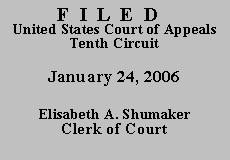

| STACEY SANDERS,
Plaintiff-Appellant, v. JOHN THOMAS; DARIUS JIMERSON; OGDEN POLICE DEPARTMENT, Defendants-Appellees. |
|
Stacey Sanders, an inmate at the Utah State Prison, appeals from the district court's order dismissing his pro se 42 U.S.C. § 1983 complaint for failure to state a claim on which relief may be granted. We affirm.
THE COMPLAINT
According to the allegations in Sanders' amended complaint, shortly before midnight on November 22, 2002, the defendant police officers, John Thomas and Darius Jimerson, observed him driving erratically and activated their emergency lights. Instead of stopping, Sanders attempted to evade the officers.
Following a brief pursuit during which Sanders steered his vehicle into oncoming traffic, he stopped his vehicle and attempted to flee on foot. When the police officers caught up with Sanders, they subdued him by hitting him in the face and kicking him. After he was restrained, Sanders admitted to the officers that he had swallowed some drugs. Because of his injuries, Sanders was transported to the hospital where a urine sample was obtained during the course of his treatment.
THE DISTRICT COURT PROCEEDINGS
Sanders' amended complaint alleged two separate Fourth Amendment violations: (1) that the police officers used excessive force to subdue and place him under arrest, and (2) that the officers conducted an illegal search when they obtained the urine sample.(1) Following service of the amended complaint, the defendants raised failure to state a claim for relief and qualified immunity as defenses. Sanders filed a response to the answer, which the district court considered as a further amendment to his complaint.(2)
The district court found that it would be futile to allow Sanders further opportunity to amend his complaint and dismissed the case pursuant to 28 U.S.C. § 1915(e)(2)(B)(ii) for failure to state a claim. Specifically, the court concluded that the force used by the police officers was objectively reasonable and that the urine sample was legally obtained under the doctrine of exigent circumstances.
STANDARD OF REVIEW
We review a decision to dismiss for failure to state a claim under § 1915(e)(2)(B)(ii) de novo, and "[d]ismissal of a pro se complaint . . . is proper only where it is obvious that the plaintiff cannot prevail on the facts he has alleged and it would be futile to give him an opportunity to amend." Gaines v. Stenseng, 292 F.3d 1222, 1224 (10th Cir. 2002) (quotation omitted). In addition to construing a pro se complaint liberally, we "must accept the [well pled] allegations of the complaint as true and construe those allegations, and any reasonable inferences that might be drawn from them, in the light most favorable to the plaintiff." Id. (citation omitted).
THE FOURTH AMENDMENT
Sanders' Fourth Amendment right not to have excessive force used against him during his arrest was not violated if the officers' actions were objectively reasonable. Olsen v. Layton Hills Mall, 312 F.3d 1304, 1313-14 (10th Cir. 2002) (quotation omitted). In turn, the reasonableness of the force used depends upon several factors, including the severity of the crime alleged, the degree of potential threat that the suspect poses to the safety of the arresting officer and others, and the suspect's efforts to resist or evade arrest. Id. at 1314. Moreover, the reasonableness of the force used is judged from the perspective of a reasonable officer on the scene. Id. (quotation omitted).
The facts alleged in Saunders' amended complaint demonstrate that the force used by the police officers was objectively reasonable. Based on his erratic driving, the officers believed that Sanders was under the influence of either drugs or alcohol. When they attempted to stop him, Sanders turned his vehicle into oncoming traffic and tried to evade them. Finally, he fled on foot to avoid capture. These allegations lead to the conclusion that the officers used an objectively reasonable amount of force under the circumstances.
We reach the same conclusion concerning Sanders' Fourth Amendment claim of an illegal search. The doctrine of exigent circumstances recognizes that a warrantless search incident to an arrest based on probable cause is justified where an officer reasonably believes that he is confronted with an emergency and the delay associated with obtaining a search warrant may result in the destruction of evidence. Schmerber v. California, 384 U.S. 757, 770-71 (1966).(3)
Here, it is unclear whether the urine sample was taken by hospital personnel for diagnostic purposes or requested by the police officers for investigatory purposes. Assuming for argument that the test was requested by the officers for investigatory purposes, Sanders' admission that he had swallowed drugs coupled with his erratic behavior justified the warrantless search under the doctrine of exigent circumstances.
The judgment of the district court is AFFIRMED. Sanders' motion to proceed in forma pauperis is GRANTED and he is reminded of his continuing obligation to make partial payments until he has paid the filing fee in its entirety.
His reply brief was filed out of time and without leave. It is therefore STRICKEN.
Entered for the Court
John C. Porfilio
*. This order and judgment is not binding precedent, except under the doctrines of law of the case, res judicata, and collateral estoppel. The court generally disfavors the citation of orders and judgments; nevertheless, an order and judgment may be cited under the terms and conditions of 10th Cir. R. 36.3.
1. Sanders also claimed Eighth and Fourteenth Amendment violations. Neither are implicated here; instead, his claims of excessive force and an unlawful search are properly considered under the Fourth Amendment. See Roska ex rel. Roska v. Peterson, 328 F.3d 1230, 1242-43 (10th Cir. 2003); Taylor v. Meacham, 82 F.3d 1556, 1560 (10th Cir. 1996).
2. Sanders agreed in this response that he could not state a claim against the Ogden Police Department.
3. Once an intrusion is found to be justified, the inquiry shifts to the manner of the intrusion, including the risk, trauma or pain. Schmerber, 384 U.S. at 771. Sanders has never alleged or argued that the manner of the intrusion (urine test) was unreasonable.